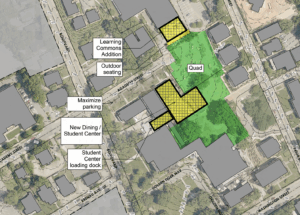
Healthcare is a rapidly growing field, fueled by an incredible need. After the COVID-19 pandemic, many healthcare workers were burned out, and many hung up their scrubs. Five years after the initial onset of the pandemic, it’s clear that the helping profession could also use a little help.
“Healthcare workers carry a tremendous weight of the healing process as they care for patients,” Barbara Steinhaus, DMA, says. “I want my students to know that they must have a way to take care of themselves while they take care of others.”
Steinhaus, chair of the department of music, has a speciality in arts in health, including a Graduate Certificate in arts in medicine. She teaches the Arts in Healthcare course, a semester-long class designed to expose healthcare students to how the various arts are used in the healthcare setting.
In Hall County, healthcare and those employed in the field are vital to the local economy, but a steady pipeline of employees trained in various specialized fields is required. The Greater Hall Chamber of Commerce reports more than 11,000 people work at the local offices of Northeast Georgia Health Systems in 2025, making it the largest employer in the county.
Brenau University has multiple programs in the Ivester College of Health Sciences, including biology and nursing; psychology, physician assistant studies, and the physical and occupational therapy programs all offer terminal degrees in their fields.
A collaborative approach
Steinhaus incorporates poetry, art, dance, and music with traditional wellness concepts, like nutrition and fitness. She begins each class with a poem, and includes a variety of information and activities for students to experience.
“I have colleagues do units on self-care, including nutrition, emotional regulation, and artistic practices,” Steinhaus says. “Throughout the course, I encourage all of my students to explore and develop an artistic practice, whether it’s singing, playing an instrument, painting, drawing, anything that allows them to express themselves.”

Collaborators include fellow educators James Lewis, DPT, and Amy Jacques, as well as University Counselor Gay Baldwin. Lewis is a professor of physical therapy who specializes in preventative wellness.
Jacques, assistant professor of psychology and coordinator of the dance/movement therapy program, says adjunctive therapies can help students see the bigger picture when treating patients or when practicing self-care.
“A healthcare professional will encounter conditions with patients who have physical and psychological components,” Jacques says. “For example, anxiety is also experienced through the body in physical sensations, such as sweaty palms and a racing heartbeat. Allowing our healthcare students to explore the dance/movement therapy treatment approach helps them incorporate understanding for their patients, and for the human body.”
Practical application
Steinhaus earned her graduate certificate in Arts in Medicine from the University of Florida in 2015. Shortly after, she began a bedside music practice at the Northeast Georgia Medical Center that she continues today as a Clinical Therapeutic Musician in the Live Therapeutic Music program. She was inspired by her late parents, who both worked in healthcare, and her doctoral dissertation on the Black spiritual.
In her bedside music program, Steinhaus uses a variety of music, including spirituals and hymns, as well as secular music, to connect with patients.
“Therapeutic music for a patient really focuses on providing a sense of calm, and the music doesn’t need a lot of intellectual context to go along with it,” Steinhaus says. “We can use melodies, or sing in a non-direct rhythm. In this process, it doesn’t demand something from the patient, and it can allow them to breathe more deeply, or reduce their blood pressure.”
In addition to practical experience, Steinhaus is also a founding member of the National Organization for Arts in Health and has authored research papers on the subject.

